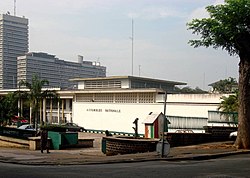This article relies largely or entirely on a single source .(September 2024) |
Parliament Parlement | |
|---|---|
| Type | |
| Type | |
| Houses | Senate National Assembly |
| Leadership | |
Chairperson of the Senate | Kandia Camara since 12 October 2023 |
Speaker of the Assembly | |
Leader of the Minorities | Hervé N'Guessan |
| Structure | |
| Seats | 99 (Senate) 255 (National Assembly) |
 | |
 | |
| Elections | |
| Indirect election | |
| First-past-the-post | |
Last Senate election | 16 September 2023 |
Last National Assembly election | 27 December 2025 |
| Meeting place | |
 | |
| Yamoussoukro (Senate) Abidjan (National Assembly) | |
 |
|---|
| |
The Parliament of Ivory Coast is the legislature of Ivory Coast. From 1960 to 2016, it was a unicameral body. It became a bicameral body after a new constitution was approved by referendum on 30 October 2016. The parliament consists of two chambers: [1]
Contents
- The Senate (upper chamber)
- The National Assembly (lower chamber)